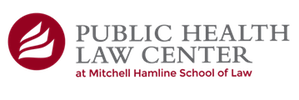The Mitchell Hamline Law Journal of Public Policy and Practice presents
Climate Change, Public Health, and the Law
Friday, Feb. 2, 2024
Symposium Description
Climate change has immediate impacts that are felt everyday across both rural and urban America. Examples include increases in forest fires due to drought and rain instead of snow in northern states due to warmer winters. Climate change’s impact is not exclusive to events in nature, community health outcomes are suffering as well. This can be seen through increases in respiratory illnesses, heart illnesses, insect born illnesses, and more.
This event will provide a basic understanding of public health law, how public health law is impacted by climate change, and how the already existing inequities in public health may be exacerbated by negative impacts of climate change. Further the event will discuss the legal routes available for local, state, and Tribal governments to address public health crises and a panel will discuss specific community responses.
The event will be held virtually on Friday, Feb. 2, 2024, and will begin at 8:30 am. Registration is required. Registration is $25 for licensed attorneys. Attorneys who attend will be able to claim 3.25 of CLE credit. Registration is free for all students as well as alumni of Mitchell Hamline, Hamline Law, and William Mitchell.
Schedule
Introduction and land acknowledgement
8:30–8:40 am | Introduction provided by Anna Cousin, Symposium Editor for the Journal of Public Policy & Practice
Land Acknowledgment provided by Angelique EagleWoman, professor of law at Mitchell Hamline School of Law and director of the Native American Law and Sovereignty Institute
Session 1
8:40–9:10 am | What is Public Health Law? with speaker Joelle Lester
Session 2
9:10–9:40 am | How Can Climate Change Impact Public Health Law? with speaker Jamie Long
Break | 9:40–9:50 am
Session 3
9:50–10:20 am | Public Health Equity & The Law with speaker Andrew Twinamatsiko
Session 4
10:20–11:10 am | Legal Pathways for Local and Tribal Governments to Respond to Public Health Crises with speakers Betsey Lawton and Philomena Kebec
Break | 11:10–11:20 am
Final Panel
11:20 am–12:20 pm | How Can Communities Take Legal Action in Response to Climate Change Implicated Public Health Crises moderated by Hudson Kingston with panelists Elizabeth Royal, Evan Mulholland, Mike Wiggins, and Jill Krueger.
Closing Remarks | 12:20–12:30 pm
Symposium Speaker Information and Biographies
Joelle Lester
Executive Director of the Public Health Law Center
Joelle Lester is a respected national leader in commercial tobacco control law and policy having spearheaded the Center’s work partnering with Black-led organizations to advocate for a federal ban on menthol cigarettes. Before attending law school, Lester was a grassroots organizer, organizing director, and executive director of the Oregon Student Association, a nonprofit higher education advocacy group. Lester earned a J.D. from the University of Minnesota Law School.
Jamie Long
Senior Staff Attorney at the Public Health Law Center and Member of the Minnesota House of Representatives
Jamie Long is a senior staff attorney with the Public Health Law Center, providing legal technical assistance on commercial tobacco control and climate justice issues to public health professionals and organizations, legal professionals, and advocates throughout the United States. Previously, Jamie worked in Congress as a Deputy Chief of Staff and legislative aide, handling a wide range of policy areas and managing a Congressional district office. Jamie also serves as a Minnesota State Representative. He earned his J.D. at The George Washington University Law School.
Andrew Twinamatsiko
Director Health Policy and the Law Initiative O’Neill Institute for National and Global Health at Georgetown University Law Center
As Director of the Health Policy and the Law Initiative, Andrew Twinamatsiko provides technical assistance for policymakers and public education on health policy legal issues — primarily focusing on access to healthcare coverage, affordability, transparency, and equity. Prior to joining the O’Neill Institute, Twinamatsiko worked as a senior staff attorney at the Public Health Law Center at Mitchell Hamline. Twinamatsiko has also served as an adjunct professor at Mitchell Hamline, where he mainly taught public health law and state and local government law. His scholarly interests are centered around the intersection of anti-Black racism and health policy. Twinamatsiko received his J.D. from the University of South Dakota.
Betsy Lawton
Deputy Director of Climate and Health at the Network for Public Health Law
In her role as Deputy Director, Climate and Health, Betsy Lawton works on a variety of public health law issues, bringing a community lawyering perspective to her work on climate change, health equity, broadband access, and rural public health. Before joining the Network, Betsy spent over a decade working to improve water quality and represented a broad range of individuals and communities facing water pollution problems. Betsy received her J.D., and a Certificate of Environmental Law, from the University of Wisconsin Law School.
Philomena Kebec
Economic Development Coordinator with the Bad River Band of Lake Superior Tribe Chippewa Indians, Associate Justice with the Leech Lake Band of Ojibwe, DrPH student at Johns Hopkins and Bloomberg American Health Initiative Fellow, and Instructor at UMD for the Masters in Tribal Administration and Government
Philomena Kebec belongs to the Bad River Band of Lake Superior Chippewa and earned her J.D. at the University of Minnesota Law School. In the years following law school, Kebec worked as an attorney with entities such as the Indian Law Resource Center, Bad River Band of the Lake Superior Tribe of Chippewa Indians, and the Great Lakes Indian Fish and Wildlife Commission. More recently, she serves as an Associate Justice with the Leech Lake Band of Ojibwe and continues to work with the Bad River Band as the Economic Development Coordinator. Additionally, Kebec serves as the Co-Coordinator of Gwayakobimaadiziwin Bad River Needle Exchange.
Hudson Kingston
Legal Director with CURE
Hudson Kingston, was named one of Minnesota Lawyer’s Lawyer of the Year in 2023. He works the Legal Director of CURE and holds a background in environmental law, public health law, and consumer protection. He brings experience partnering with tribes, local nonprofits, low-income advocates, environmental and social justice groups, and public employees. Over the course of his career, he has worked on litigation and policy related to climate change, water justice, and environmental justice. He earned his J.D. from the University of Iowa School of Law.
Elizabeth Royal
Attorney with Elizabeth Royal Law Office, former Red Lake Nation Tribal Judge, and General Counsel for East Phillips Neighborhood Institute (EPNI)
Named attorney of the year in 2023 in Minnesota Lawyer, Elizabeth Royal works on civil litigation, criminal defense, and public health law as an Attorney. She graduated from Mitchell Hamline School of Law in 2002 with her JD and attended the University of Minnesota School of Public Health in 2014-2016. Royal has been in private practice for over 20 years and served as a Tribal Judge for the Red Lake Tribal Nation Health & Wellness Court from 2017 to 2022.
Evan Mulholland
Healthy Communities Program Director at Minnesota Center for Environmental Advocacy
Evan holds a J.D. from Harvard Law School, and an LL.M. in Environmental Law from Vermont Law School. Prior to working at MCEA, Evan was a Assistant Attorney General at the New Hampshire Department of Justice and served as Compliance Bureau Chief of the Air Resources Division at the New Hampshire Department of Environmental Services.
Mike Wiggins
Former Tribal Chairman of the Bad River Band of Lake Superior Tribe Chippewa Indians
Mike Wiggins Jr. served 12 years as Tribal Chairman/Executive Director of the Bad River Band of Lake Superior Chippewa. He recently ended his last term in November of 2023. Wiggins is a major advocate for the conservation of natural resources and the protection of water. In his time as Chairman there were many environmental protection issues that the Tribe proactively stood up for including issues with mining, oil pipelines, CAFO’s and water privatization. Before becoming the Chairman of the Bad River Band, Wiggins served as a conservation warden for the Great Lakes Indian Fish and Wildlife Commission and oversaw a Bad River AODA Prevention Program working with Tribal Youth. Wiggins got his bachelor’s degree in Criminal Justice from UW-Superior in 1992, and in 2019 he was honored as an Outstanding Alumni of UW-Superior.
Jill Krueger
Director of Climate and Health at the Network for Public Health Law
Jill Krueger’s current work with the Network for Public Health involves climate adaptation and mitigation, the Farm Bill and agricultural policy, rural health, oral health, literacy, and mental health promotion in school and community settings. Before joining the Network in 2010, Jill was a senior staff attorney at Farmers’ Legal Action Group. She graduated from the University of Iowa College of Law.



